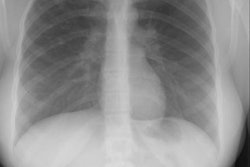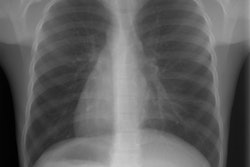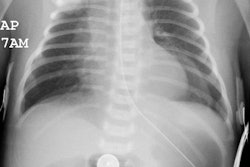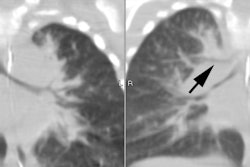Alpha-1-Antitrypsin Beficiency:
Clinical:
Alpha-1-antitrypsin deficiency is the most common metabolic liver disease in children. Over 90% of the alpha-1-antitrypsin protein is produced in hepatocytes by codominant gene expression on chromosome 14. The protein inhibits neutrophil elastase which will act unopposed in patients with severe deficiency. The unopposed elastase is damaging to the lower lungs (producing a panlobular emphysema) which are more seriously affected due to the dependent gravitational distribution of pulmonary blood flow. Patients generally present in the 4-5th decade with dyspnea. There is wide variation in the clinical manifestations of the disorder. In fact, up to 20% of homozygous deficient patients never develop clinically apparent emphysema [1]. Smokers have a 15-20 year decrease in survival relative to non-smokers.
Extrapulmonary manifestations of the disorder include cirrhosis with an increased risk for hepatocellular carcinoma.
REFERENCES:
(1) Radiographics 2000; Meyer CA, et al. Diseases of the hepatopulmonary axis. 20: 687-698



